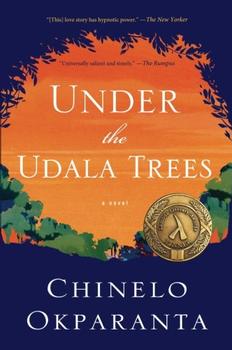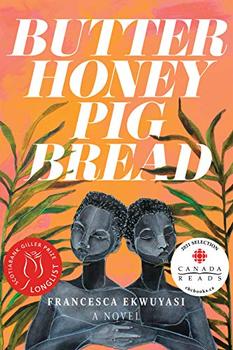Summary | Excerpt | Reading Guide | Discuss | Reviews | Beyond the book | Read-Alikes | Genres & Themes | Author Bio

Inspired by Nigeria's folktales and its war, Under the Udala Trees is a deeply searching, powerful debut about the dangers of living and loving openly.
A New York Times Book Review Editors' Choice
One of NPR's Best Books of 2015
One of the Los Angeles Times 56 Fabulous Works of Fiction and Poetry for the Holidays
One of the Wall Street Journal's 15 Books to Read This Fall
One of the Millions Most Anticipated Reads for 2015
2015 NAACP Image Awards Nominee (Outstanding Literary Work of Fiction)
One of The Root's 15 Powerful Works of Fiction by Black Authors in 2015
One of Cosmopolitan Magazine's 24 Books to Read This Fall
One of Gawker's 9 Must-Reads for Fall
Nominated for the NAACP Image Awards, "Outstanding Literary Work—Fiction"
Lambda Literary Award Finalist, "Lesbian Fiction"
A New York Times Book Review Editors' Choice
One of the Wall Street Journal's "15 Books to Read This Fall"
A Shelf Awareness "Best Book of 2015"
.... plus many more awards & nominations
Ijeoma comes of age as her nation does; born before independence, she is eleven when civil war breaks out in the young republic of Nigeria. Sent away to safety, she meets another displaced child and they, star-crossed, fall in love. They are from different ethnic communities. They are also both girls.
When their love is discovered, Ijeoma learns that she will have to hide this part of herself. But there is a cost to living inside a lie.
As Edwidge Danticat has made personal the legacy of Haiti's political coming of age, Okparanta's Under the Udala Trees uses one woman's lifetime to examine the ways in which Nigerians continue to struggle toward selfhood. Even as their nation contends with and recovers from the effects of war and division, Nigerian lives are also wrecked and lost from taboo and prejudice. This story offers a glimmer of hope — a future where a woman might just be able to shape her life around truth and love.
Chinelo Okparanta's debut novel Under the Udala Trees is a heartfelt coming-of-age story set in Nigeria. It should especially appeal to those who like reading about other countries and cultures, as well as anyone who simply enjoys a well crafted coming-of-age novel; book groups in particular will likely find it's a good choice for discussion...continued
Full Review
 (706 words)
(706 words)
(Reviewed by Kim Kovacs).
Over the course of Under the Udala Trees, the heroine, Ijeoma, discovers she's a lesbian, at first fighting her inclinations and trying to fit in, but later accepting that she's different from many of her peers.
 Although homosexuals have gained more acceptance over the past decade in the United States and other Western countries, they've actually lost rights over the past few years in many areas of Africa. Same-sex relations are currently outlawed in at least 34 of the 55 African states, with Nigeria's Same Sex Marriage Prohibition Act being among the most strict. Unanimously passed by Nigeria's House of Representatives and signed into law by (then) President Goodluck Jonathan on January 7, 2014, the law imposes a penalty of up to 14 ...
Although homosexuals have gained more acceptance over the past decade in the United States and other Western countries, they've actually lost rights over the past few years in many areas of Africa. Same-sex relations are currently outlawed in at least 34 of the 55 African states, with Nigeria's Same Sex Marriage Prohibition Act being among the most strict. Unanimously passed by Nigeria's House of Representatives and signed into law by (then) President Goodluck Jonathan on January 7, 2014, the law imposes a penalty of up to 14 ...

If you liked Under the Udala Trees, try these:

by Afabwaje Kurian
Published 2025
Set against the backdrop of 1970s Nigeria teetering between post-colonial dependency and self-rule, Before the Mango Ripens examines the enduring themes of faith, disillusionment, and the search for belonging. Both epic and intimate, Afabwaje Kurian's debut announces a brilliant new talent for readers of Imbolo Mbue and Chimamanda Ngozi Adichie.

by Francesca Ekwuyasi
Published 2020
Spanning three continents, Butter Honey Pig Bread tells the interconnected stories of three Nigerian women: Kambirinachi and her twin daughters, Kehinde and Taiye.